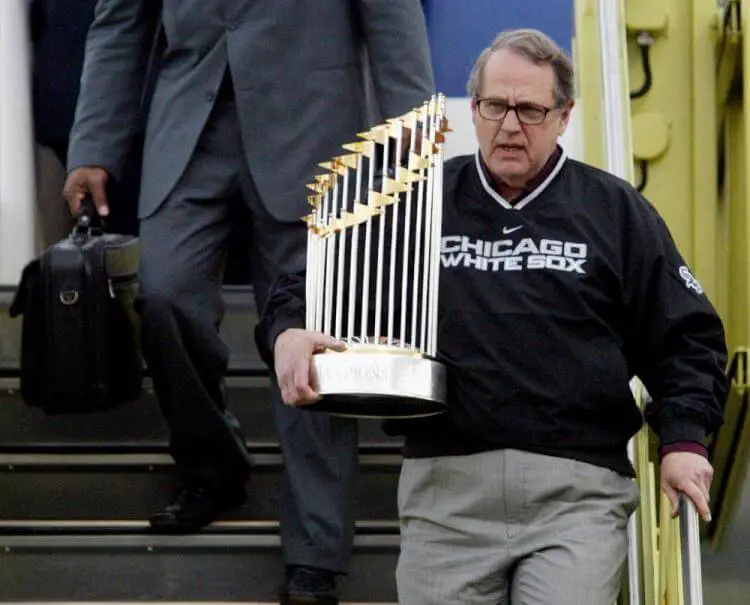Sometimes when life throws you a curveball, you just have to sit back, wait and knock it out of the park. White Sox broadcaster and former Major Leaguer Darrin Jackson is living proof.
Now entering his 11th year alongside Ed Farmer in the White Sox radio booth, Jackson finds himself in a place he never thought would be a destination. Others who followed his career thought it would be a perfect fit.
While Jackson was playing professionally in San Diego in 1992, the beat writers for the Padres would often ask him what he’d want to do after baseball. They asked about managing or coaching, and one asked about the possibility of becoming a baseball broadcaster. That left Darrin wondering if the writers knew something that he didn’t. Was he being released? Sent to the minors? Jackson was at a loss for words, which of course isn’t good for an announcer, “Um, I don’t know what you’re talking about. I’m just talking to you right now.”

The writers didn’t have any inside knowledge because Jackson, or DJ as he’s affectionately known, continued his major league career which all in all spanned 12 years. Jackson even spent two seasons in Japan. He was originally drafted by the Chicago Cubs in 1981, making his major league debut with the team in 1985. He really didn’t get much playing time on the North Side and actually asked the team to deal him, which they did in 1989 to the Padres.
He saw a few cities in the course of his time in the ‘bigs’. From San Diego he was dealt to Toronto in 1993. From Toronto it was on to the Mets and eventually the White Sox in 1994.
He then would leave the states and sign with the Seibu Lions of the Japanese Pacific League in 1995 staying there through the ’96 season, returning to the majors in 1997 with the Twins, then to the Brewers in ’98 before returning to Chicago with the Sox in 1999, which turned out to be his final season.
Jackson knew it was destiny returning to the South Side, because as he asked himself, “What would be a place for me to finish my career that would be great? That I’d want to work for that organization, when I got done playing and of all the places I had played instantly I thought about Jerry Reinsdorf and the White Sox. As an organization there was no other place I’d rather be.”

After the season ended, he was not planning to retire, but an offer came his way and he took it.
“As it went being here (Chicago) in 1999, when I came back in my final year of playing, it was just right place, right time, because I was thinking about another year of playing actually, but an opportunity opened up in the broadcast booth and I was offered the opportunity to come up and do that” Jackson said. “I said you know you’re 36 years old, how much more are you going to play? I’m in good shape that’s not the issue, it’s just I’m really not playing anymore at all. I was just sitting around watching baseball, so why not go up there in the booth and watch baseball and talk about it.”, recalls Jackson.
He started on White Sox television with the recently retired Ken “Hawk” Harrelson, then transitioned into the radio booth with Farmer beginning with the 2009 season.

As a former player Jackson spoke about how he handles a broadcast, especially when it comes to being critical of those now playing the game he did for so long. DJ likes to have fun but in the end the goal is a simple one.
“Tell the truth, of course you want to be honest, our fans aren’t stupid, they know what they’re hearing out of my mouth whether its factual or fiction. I try to do it in a way where it’s never offensive. I remember as a player when broadcasters would say something and then put their own personal spin on it and I never ever liked when somebody would go ‘I don’t even know why is this guy here, what’s he even…’ look that’s not being a professional, if you’re playing bad say this guy is playing terribly, he’s not doing his job he can play better.” Jackson continued, “Will I get on a guy that’s not hustling or making mental mistakes? Absolutely, and I have no problem walking right up to him after a game and if they want to say something, I’m right here, we can talk about it and I’ll tell you my side.”
The no nonsense approach is what helped make Jackson a major leaguer for so many years and it’s what’s making him so good at his current job on White Sox radio. But DJ is not without a sense of humor, especially when I reminded him of the old saying in the broadcasting business: it’s a lot easier up here [in the booth] than it is down there [on the field], but as a former player and not a trained broadcaster Jackson laughed that off.
“Hilarious! That’s definitely not true. I’ve got a whole bunch of names I can write down right now, of guys that would tell you, I’ve tried that and I failed, so it’s not that easy.”
Andy Masur is a columnist for BSM and works for WGN Radio as an anchor and play-by-play announcer. He also teaches broadcasting at the Illinois Media School. During his career he has called games for the Chicago Cubs, San Diego Padres and Chicago White Sox. He can be found on Twitter @Andy_Masur1 or you can reach him by email at Andy@Andy-Masur.com.







